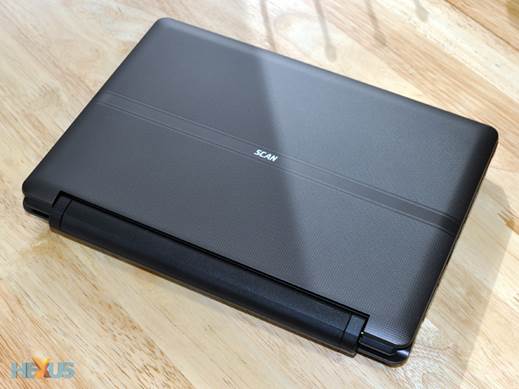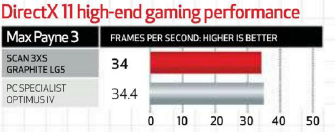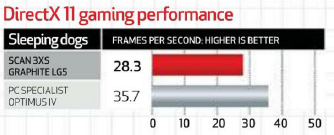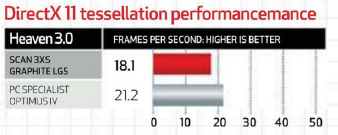Good things come in small packages,
but are all small things good?
We're living in the post-Ultrabook era.
Even when laptops are designed to do something much more taxing than pushing
websites around, we still expect them to be sexy.
Which explains why this diminutive laptop
has us in two minds. On one hand it's a tiny machine that packs a decent punch
on the hardware side of things. On the other, it's a little on the ugly side
due to its thickness and drab colouring. It's also surprisingly heavy for its
size. It's not an Ultrabook, in other words.

The 3XS Graphite LG5 isn’t looking to make
a name for itself with its aesthetics - it's about what's inside that small, if
not quite svelte, chassis. Designed from the core up as an 'ultra-portable’
gaming laptop, this packs a punch where it matters the most -the processor and
graphics. The Intel Core i5 B210M is a dual-core, four-thread 22nm Ivy Bridge
processor running at 2.5GHz. This is a capable workhorse of a chip that will
handle all the games you throw at it, and chew through more serious work as
well.
While the Core i5 is a great option for any
modern laptop, it's in the graphics department that Scan is hoping to separate
this machine from the droves. The 2GB GeForce GTX640M is a more than capable
offering, especially in the context of this screen. Here we have an 11.6-inch
TN panel, boasting a native resolution of 1,366 x 768 pixels. We'll admit that
isn't a lot of room in Windows, and the TN viewing angles don't make things
easy here either, but in gaming terms this pairing really excels.

Unlike some of Nvidia's mobile GPUs, what
we have here is a genuine Kepler chip -the 28nmGK107. This GPU runs at a
healthy 835MHz and boasts a pair of SMX modules, equating to 384 CUDA cores.
Indeed, so powerful is this GPU that it's only in the memory department that we
see a difference between this and the theoretically more powerful 660M found in
PC Specialist's laptop on page 40. The main news to take away from this GPU is
that you can hit great framerates at the native resolution with a minimal
amount of tweaking, if any is needed at all.
Optional extra
The storage side of things is a little less
convincing, because while you'll find a Corsair Force 3 SSD keeping things
speedy, at just 120GB there's not a lot of room for the OS and the many games
you'll want to throw on it. We'd recommend going for a 240GB drive for an extra
£64 using Scan's system configuration tool. The final key part of the
specification is the8GBofDDR31,600MHz RAM, providing plenty of room to work and
play in.

Overall, this Scan laptop is a bit of a
mixed bag. The SSD is too small, but easily rectified online. The undersized
screen isn't as easy to fix though, and we'd advise anyone looking to do work
to look elsewhere. However, as a gaming system there's a lot to love here. The
strong graphics performance and low native resolution equate to fast framerates
without having to wind the settings down.
Technical analysis
This machine is all about gaming
performance. The pairing of the 650M with a relatively low-resolution screen
equates to very healthy frame rates. The important upshot of all of this is
that we have a laptop that can play the latest titles at medium-to-high
settings very smoothly. There may be more powerful machines out there, but
you'd be hard pushed to match the gaming prowess for anything like the cash.



|
Vital statistics
§ Price:
$1,046.4
§ Manufacturer:
Scan
§ CPU:
2.5GHz Intel Core 153210
§ GPU:
2GB Nvidia GeForce GT650M
§ RAM:
8GB DDR31,600MHz
§ Storage:
120GB Corsair Force 3
§ Screen
size: 11.6-inch
§ Native
resolution: 1,366 x 768
§ Dimensions:
287 x 207 x 37mm
§ Weight:
1.8kg
§ Warranty:
Two years C&R
|